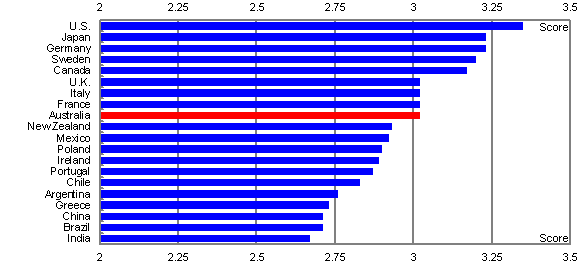The much awaited Innovation Statement has arrived. The ABC has a useful summary. Michelle Grattan has two lead-in pieces at The Conversation, where there is heaps more.
Bernard Keane at Crikey (paywalled) details how the Rudd/Gillard governments trailed their coat in this area without grabbing it by the throat, to mix the metaphors. The trouble says Keane is that we don’t have a business culture that facilitates innovation. Terry Cutler, back in 2008, wrote about our lifestyle approach to business:
- Too many of our business owners or managers have what we might describe as a lifestyle approach to business. Even many of our so-called success stories look like under-performers when benchmarked globally. This lifestyle model of business strategy imposes a false ceiling on ambition: success is having the designer car in the garage, and the holiday home or two…. At a recent forum I actually heard people saying they didn’t need to expand or export because they were doing it quite comfortably as things are.
Sounds like a sensible balance to work and life-style, but the raw facts are that it is easier to grow a company by a second $10 million than it is to achieve the first.
Another problem is that our managers are not much chop. David Gruen speaking in 2012 put our manufacturing managers at mid-range:

For small companies, I think that’s flattering us.
Turnbull seems to be obsessed with high-tech start-ups, which, says Jason Murphy at Crikey, are a really bad idea.
- The key features of a tech start-up are this: it has no customers and a strong chance of going broke. What most of these businesses do is funnel capital (investors’ money) into work nobody asked to be done. They build a product for which there is no market, exhaust their funds, close. They’re a bit like a make-work project.
Some of the better ones are picked up by venture capitalists, and are subsequently bought by larger businesses. So:
- In short, the average tech start-up adds little value to the economy, employs few people, and pays out to a handful of already rich people if it succeeds. And we’re now going to give them tax breaks to do so.
The other big winners from a successful start-up “eco-system” are the big companies that gobble up small start-ups.
Murphy says we need to think beyond technology, and beyond start-ups of new ideas. Innovation also means innovation in operational and managerial processes and marketing as well as in products. Innovation in that sense can be best leveraged in big business.
Finally, the notion that teaching coding to primary school kids is the answer really gives me the willies. We need creative problem solvers with excellent human relationship skills.

When I last looked Australia was a world leader in mining and mining related innovation. Hardly surprising given the size of the business and the value of small improvements. It is also a business where the competitive position of mining companies is largely determined by the deposit they own rather than how good they were at things like increasing product recovery. It led to a culture where mining companies were happy to cooperate and share information.
We should be looking at the areas where innovation will make a lot of difference to Aus.
Our Agricultural sector a world beater in innovation as well despite all the regulatory and faux- environmental nonsense.
Alas the construction industry is an innovation free zone due to over regulation and the strict constraints, amazingly from a local Government level first and the other levels compound this.
Also, not many people know, the ” Australian Standards (AS)” are formulated and owned by a private company (?) with no standing in Law, unless incorporated in a contract. No architects have the gonads to step outside the AS box.
If they do, they don,t get any Government or private work cause local council inspectors smash them.
Hmm. The house I live was built by a small private construction firm. Nearly everything about it is dodgy poorly built crap, although of course as average punters hubby and I couldn’t see that until after we moved in and the mistakes started costing us thousands of dollars in repairs. Of course, the builders have gamed the regulations that are supposed to protect buyers, so there isn’t a damn thing the poor mug punter can do about it.
As is typical in Australia, the builder screws his workers and his customers, doing just enough to ensure the building doesn’t fall down before he can sell it, makes a handsome profit and is in every imaginable way a human imitation of a leech.
Jumpy, can you link to some of your masterpieces so we can make up our own minds about whether you buck the trend?
Jumpy: Agriculture is another innovative industry because it is a big part of the Australian economy and is backed by CSIRO.
Not sure what your construction patch is but I was suitably impressed when I moved from working for mining companies to working for Thiess.
Back in the good old days when I started work I was most impressed by the riveters putting up structural steel catching the red hot rivets as they were thrown up to them from below. Some hings have changed.
John, I believe Thiess was taken over by Leighton, who were themselves majority owned by the German company Hochtief, who let them be, but gave them access to German construction technology.
Now Hochtief has been taken over by the Spanish company ACS who dumped the Leighton brand in favour of CIMIC.